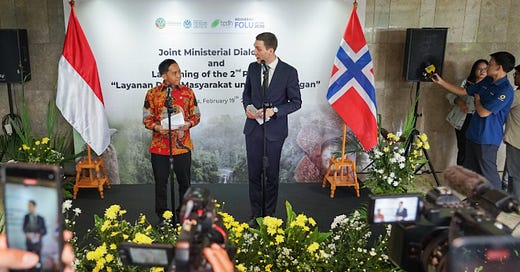Indonesia’s political appointments raise transparency and accountability concerns regarding Norway’s forest funding in the country
Friends of the Earth and Greenpeace are calling for a full audit of Norway’s forest funding in Indonesia.

On 19 February 2025, Indonesia and Norway agreed to extend their climate and forest partnership until 2030. This is latest in a series of agreements between the two countries. In 2010, Erik Solheim, then-Norway’s Minister of the Environment and International Development and Marty Natalegawa, then-Indonesia’s Foreign Minister signed a Letter of Intent for US$1 billion-worth of reduced deforestation.
Back in 2010, REDD-Monitor asked whether the deal would result in US$1 billion of continued deforestation:
But in 2021, Indonesia scrapped the US$1 billion deal — out of frustration that Norway had not transferred enough money. And in September 2022, a new deal was signed, that was even worse than the previous one.
In the 15 years since the US$1 billion deal was signed, Norway has transferred only US$216 million to Indonesia.
While deforestation in Indonesia has fallen since 2015, a recent report by the Norwegian University of Life Sciences found that the datasets used to measure deforestation in Indonesia do not match. And the Ministry of Forestry is cherry picking the data in order to claim that deforestation since 2016 has fallen by 90%.
In fact, the researchers found, a more realistic figure would be 50% reduction in deforestation since 2016. But in 2023, deforestation increased, with deforestation hotspots moving from Sumatra to Kalimantan and Papua.
Political appointments
The Memorandum of Understanding signed in February 2025 follows on from the agreement signed in September 2022 to support Indonesia’s efforts to reduce emissions from Forestry and Other Land Use (FOLU).
At a press conference in Jakarta about the latest forest deal, Indonesia’s Minister of Forestry, Raja Juli Antoni, said that,
“Indonesia is committed to achieving its FOLU Net Sink 2030 through multiple avenues of efforts and collaboration. We welcome the extension of our partnership with Norway as one key strategy to realize our targets. This partnership is a great opportunity not only to reduce emissions but also to promote biodiversity, support local communities, and foster economic resilience through sustainable and inclusive approaches.”
What he did not mention was that in a decree dated 31 January 2025, he had appointed several members from his political party, the Indonesian Solidarity Party (PSI), to well-paid positions within the office that is responsible for the FOLU Net Sink 2030 initiative. Raja is one of the founders of PSI and is currently the party’s secretary-general.
Hans Nicholas Jong reports for Mongabay that the Indonesian government established an operation management office to coordinate, monitor, and evaluate the initiative, which is largely funded by Norway, with money also coming from the UK.
Indonesia’s plans under the FOLU Net Sink 2030 initiative could need as much as US$12.4 billion, according to an Indonesian government official speaking in 2023. This money could come from “domestic and foreign carbon markets, the state budget, regional budgets, private investment, domestic and foreign grants, and other funding sources,” Agus Justianto, then-Director general of sustainable forest management at the Environment and Forestry Ministry, told Antara.
Budget cuts for peatland restoration and fire prevention
Greenpeace Indonesia points out that while money is flooding into parts of the government, key agencies responsible for forest and peatland restoration and fire prevention are facing budget cuts.
Muhammad Iqbal Damanik, of Greenpeace Indonesia, speaking to Mongabay, suggests a better way of using the money:
“Why not allocate the money to critical areas like peatland restoration? For example, why not give funding for forensic investigations into peatland fires? That way, the government can hold companies accountable for peatland destruction. That would be far more beneficial than spending money on hiring political appointees.”
Indonesian civil society organisation Bareng Warga calls for more supervision of FOLU Net Sink 2030’s funding. In a press release on 7 March 2025, Bareng Warga states that,
A thorough review is essential to ensure that their previous and current contributions are not being misallocated due to political influences, but are instead driving tangible environmental outcomes as intended. . . .
We urge the United Kingdom and Norway to act swiftly to investigate the use of their funds in the FOLU Net Sink 2030 program.
Norway’s Ministry of Climate and Environment told Mongabay that it would “continue to follow the issue through close dialogue with Indonesia’s Ministry of Forestry and relevant partners”.
Which is a long way from conducting a “thorough review”.
Greenpeace’s Iqbal criticised Norway’s “wait and see” approach. “If we look at past Norway-Indonesia agreements, it does seem like Norway tends to follow whatever the Indonesian government says,” he told Mongabay.
Iqbal points out that the September 2022 Memorandum of Understanding between Norway and Indonesia includes the aim for “full transparency”.
PSI members occupy about one-quarter of the 43 positions in the operation management office. None of the PSI members have expertise in forestry or climate science, Mongabay reports. Four have backgrounds in media and journalism and others in activism, social media, and psychology.
Development Today reports that Friends of the Earth and Greenpeace are calling for a full audit of Norway’s forest funding in Indonesia.






